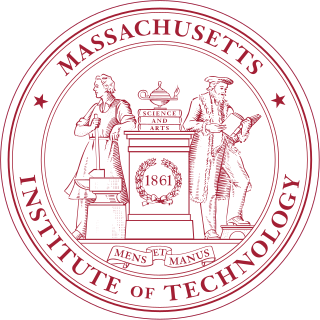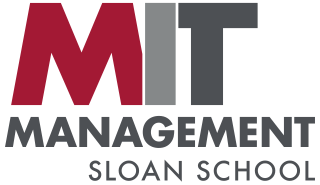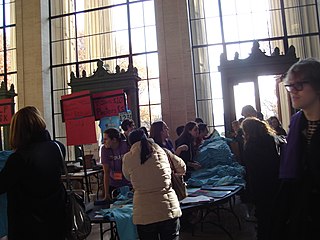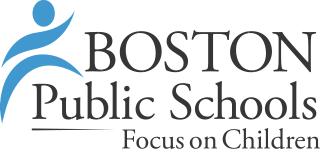
A community college is a type of undergraduate higher education institution, generally leading to an associate degree, certificate, or diploma. The term can have different meanings in different countries: many community colleges have an "open enrollment" for students who have graduated from high school. The term usually refers to a higher educational institution that provides workforce education and college transfer academic programs. Some institutions maintain athletic teams and dormitories similar to their university counterparts.

The Massachusetts Institute of Technology (MIT) is a private land-grant research university in Cambridge, Massachusetts. Established in 1861, MIT has played a significant role in the development of many areas of modern technology and science.
A Master of Business Administration is a postgraduate degree focused on business administration. The core courses in an MBA program cover various areas of business administration such as accounting, applied statistics, human resources, business communication, business ethics, business law, strategic management, business strategy, finance, managerial economics, management, entrepreneurship, marketing, supply-chain management, and operations management in a manner most relevant to management analysis and strategy. It originated in the United States in the early 20th century when the country industrialized and companies sought scientific management.

The Sloan School of Management at Massachusetts Institute of Technology is the business school of the Massachusetts Institute of Technology, a private university in Cambridge, Massachusetts. MIT Sloan offers bachelor's, master's, and doctoral degree programs, as well as executive education. Its degree programs are among the most selective in the world. MIT Sloan emphasizes innovation in practice and research. Many influential ideas in management and finance originated at the school, including the Black–Scholes model, the Solow–Swan model, the random walk hypothesis, the binomial options pricing model, and the field of system dynamics. The faculty has included numerous Nobel laureates in economics and John Bates Clark Medal winners.

The Illinois Mathematics and Science Academy, or IMSA, is a three-year residential public secondary education institution in Aurora, Illinois, United States, with an enrollment of approximately 650 students.

Upward Bound is a federally funded educational program within the United States. The program is one of a cluster of programs now referred to as TRiO, all of which owe their existence to the federal Economic Opportunity Act of 1964 and the Higher Education Act of 1965. Upward Bound programs are implemented and monitored by the United States Department of Education. The goal of Upward Bound is to provide certain categories of high school students better opportunities for attending college. The categories of greatest concern are those with low income, those with parents who did not attend college, and those living in rural areas. The program works through individual grants, each of which covers a restricted geographic area and provides services to approximately 59,000 students annually. The program focuses on academic and nonacademic resources and activities like visits to museums or tutoring for school work. Students are encouraged to be involved in Upward Bound for the entire academic year and a 6-week long summer program. Many students who are also granted access into the Upward Bound program are labeled as first generation college students, who are students that are the first in their family to attend college. This program is set in place for students who come from low income families as well as underrepresented schools and gives them an opportunity to excel in college.
Gifted education is a sort of education used for children who have been identified as gifted and talented.

A summer camp or sleepaway camp is a supervised program for children conducted during the summer months in some countries. Children and adolescents who attend summer camps are known as campers. Summer school is usually a part of the academic curriculum for a student to make up work not accomplished during the academic year.
A course credit is a measure of the size of an educational course, often used to determine whether the requirements for an award have been met, to facilitate transfer between institutions, or to enhance intercomparability of qualifications. Credit may be input-based – defined by the quantity of instruction given – or outcome-based – defined by the learning outcomes and a notional time to achieve those outcomes.
Tech Squares is a square and round dance club at the Massachusetts Institute of Technology. It was founded in 1967 and is still holding dances today. Tech Squares dances high-energy modern Western squares in an "all position" style, with no dress code or couples requirement. It has many student members. The club dances the Plus program, but many members also dance advanced and challenge levels.

Splash is a yearly academic outreach program by many universities that invites high school students to attend classes created and taught by students, alumni, and local community members. Splash was originated in 1988 by MIT's student-run Educational Studies Program (ESP). Today, most Splash programs are affiliated with and coordinated by Learning Unlimited.

Saint Viator High School is a private Roman Catholic co-educational secondary school run by the Clerics of Saint Viator in Arlington Heights, Illinois. It was founded by Father Louis Querbes and opened in 1961 to serve as a college-preparatory school for students from the northwest suburbs of Chicago, which is part of the Archdiocese of Chicago.
The MIT Museum, founded in 1971, is located at the Massachusetts Institute of Technology in Cambridge, Massachusetts. It hosts collections of holography, technology-related artworks, artificial intelligence, architecture, robotics, maritime history, and the history of MIT. Its holography collection of 1800 pieces is the largest in the world, though only a few selections from it are usually exhibited. As of 2023, works by the kinetic artist Arthur Ganson are the largest long-running displays. There is a regular program of temporary special exhibitions, often on the intersections of art and technology.
WSHS (91.7) is a student-run high school radio and public radio station operating on a non-commercial license in Sheboygan, Wisconsin. Owned by the Sheboygan Area School District, the station's studio is located on the second floor of Sheboygan North High School on the city's north side, and the transmitter is located in the central courtyard of the North High building. An auxiliary studio is also located at Sheboygan South High School, though most programming originates out of North High. The station's signal covers most of Sheboygan and portions of Kohler and the towns of Mosel, Sheboygan and Wilson, and is also simulcast as the audio on the district's South-produced cable channel SASD TV during non-programming hours, which is carried on Spectrum and AT&T U-verse systems in Sheboygan, Fond du Lac and Washington Counties.

Boston Public Schools (BPS) is a school district serving the city of Boston, Massachusetts, United States. It is the largest public school district in the state of Massachusetts.

The traditions and student activities at the Massachusetts Institute of Technology encompass hundreds of student activities, organizations, and athletics that contribute to MIT's distinct culture.

Cathedral High School is a private co-educational, college preparatory Catholic junior high and high school in Boston, Massachusetts, United States. It is located in the historic South End neighborhood, adjacent to the Cathedral of the Holy Cross, the seat of the Roman Catholic Archdiocese of Boston.
HiBuR is a voluntary student program. HiBuR's main purpose is to forge connections between students of the Israel Institute of Technology (Technion) and Massachusetts Institute of Technology (MIT) by offering joint educational activities and practical experiences at both universities.
The African Leadership Academy (ALA) is an educational institution located in the outskirts of Johannesburg, South Africa, for students between the ages of 16 and 19 years old, with current alumni coming from 46 countries.

Learning Unlimited is a US nonprofit organization founded in 2007 that supports college students and creates educational outreach activities for area middle and high school students.












